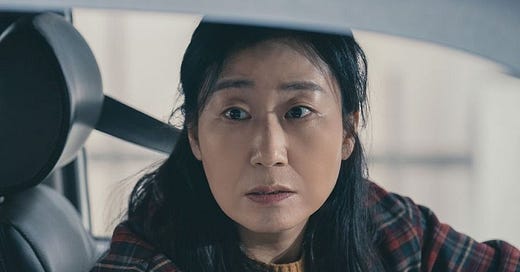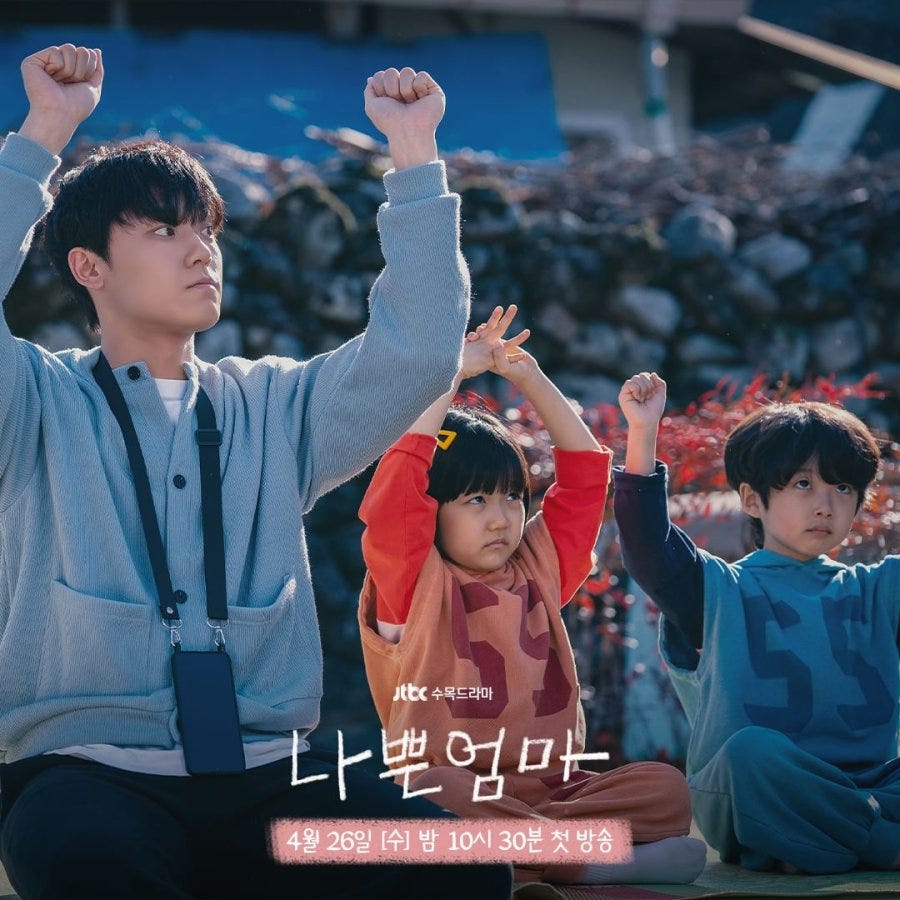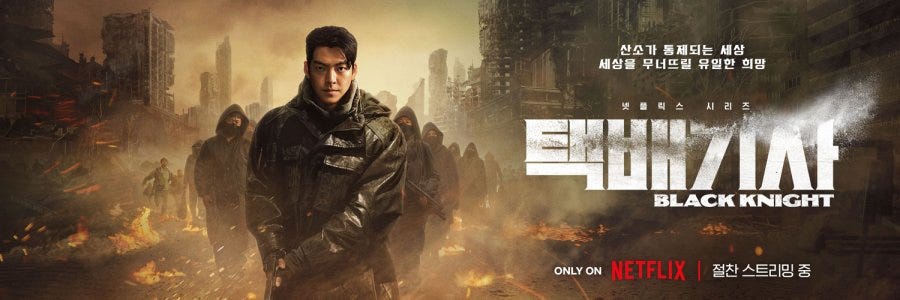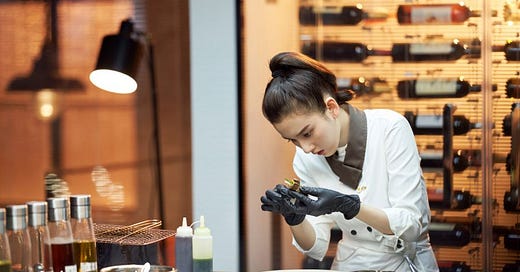
I was really enjoying The Good Bad Mother until the titular character in a fit of cancer-induced rage believed she was the second coming of Jesus Christ. Or something akin. Jesus in the gospels however never pushed the ill or the maimed into a muddy pond nor did he blame those who came to be healed that they weren’t trying hard enough. At this point I felt that Mother crossed a line of no return. So did the entire series in fact. Up till then I tolerated her schizophrenic pendulum swings and thought at some point Mother would acknowledge her sins… show some remorse. The show hadn’t to this point overtly condoned her actions. At times she seemed to have softened. Some of the guilty looks placated some of the inner outrage. But after episode 8, I’m bewildered by the head of the village (in an act of dramatic irony perhaps?) saying that Kang-ho’s ability to walk is a miracle from on high. (Not to mention what could be implied about disability) I might have happily bought into that narrative if it hadn’t been preceded by Mother’s ruthless foray into her brand of “tough love” yet again.
I’ve been asking myself and various places on the internet if the show is condoning abuse. Tacitly or explicitly. I don’t have any trouble with fiction depicting situations that happen in real life. Why would I? A lifelong crime fiction fan like myself can claim to watching depictions of horrors that humans inflict on other humans. That’s never the issue. The Glory and The King of Pigs had some of the worst instances of bullying I’ve ever seen on television. But when a drama appears to justify a mother’s arguably abusive behaviour as “tough love” because it happens to yield the desired outcomes, a feeling of uneasiness creeps in. And it never leaves me. There doesn’t seem to be any negative consequences for her unorthodox “methods”. Kang-ho is still a good son. Or is he? Or maybe he suffers from Stockholm Syndrome. Until he sets off on a harebrained revenge scheme which sees him as a child-like amnesiac and is wheelchair bound. And then of course there are those flashbacks which explain why Mother is mad. Or why there’s method to her madness. She refused to let him attend picnics as a child because of her own traumatic, tragic past. She was unfailingly tyrannical in ensuring his academic excellence because she lost her beloved husband. And then she’s diagnosed with cancer. Which seems to justify more insanity. Is this the show’s way of rationalizing more mad mother machinations? It begs the question.
I feel manipulated. Sure every K drama does its darndest to tug at the heartstrings. I get it. Slice-of-life dramas pull particularly hard. However, it shouldn’t be so obvious that my buttons are being pushed this hard if the writing has a bit more finesse to it. Mother’s bipolar swings are just downright jarring. One minute she’s nice as pie and the next she turns into a wild boar rampaging through the forest. All in the name of mother’s love apparently.
I’m getting tired of K dramas trying to cover all the writing sins by these whimsical touches. I accept that many K dramas pretend to be fairy tales for some wiggle room but fairy tales are also morality tales. They don’t exist in some kind of vacuum. Or let bad behaviour off the hook. The problem is that few people read or have read fairy tales in their original form so there’s this erroneous belief that they’re all about fantasy and romance. They are starkly grim. They deal with hard core life and death issues of the time. Disney gets the blame for sanitizing some of the classics but Hans Christian Andersen, the Brothers Grimm et al didn’t hold back.
Mother’s relentless abusive antics have soured my regard for the show. I’ll persevere of course because I want to see Kang-ho, Mi-joo and the kids acknowledge each other. The precocious twins need their father but there needs to be plenty of repentant tears before the end if I’m to buy into the happily-ever-after. There’s not a lot that original about this show. I pretty much worked out the entire plotline by the end of the second episode and that’s no boast. Besides Makjang Mother is the staple of many a K drama.
Performances are terrific all round. The leads are great in this. The chemistry between Lee Do-hyun and Ahn Eun-jin is adorable which more or less proves my point that Lee Do-hyun was miscast in The Glory. But I reserve my biggest praise for the children who are just absolutely a joy and a delight. They light up the screen every time they’re on.
I caught Black Knight on the weekend. Admittedly it’s highly derivative. Very much so. I was a playing a game of “where have I seen that done before” throughout the drama’s unfolding. But it’s not to say I didn’t like it. There was enjoyment to be had in seeing familiar sci-fi tropes being blended in such a way. Any dystopian futuristic story is worth a look as far as I’m concerned. I like that it was short although I agree that it could have done with an extra episode.
I realised while scrolling through his bio that I had never seen Kim Woo-bin in anything until now. He has the sort of voice that I can listen to all day even if he’s just reading off an obscure 19th century tome. Lucky Shin Min-a. But apparently his enigmatic 5-8 is not exactly the main character although he is kind of the lead. Does this make sense? The hero’s journey belongs to a lad called Sa-wol although 5-8 is the primary mover and shaker in this denunciation against corporatism and corporate capture. A message I can surely wholeheartedly get behind.
The show is set in future South Korea where the air is bad outside and society is still stratified more or less along similar lines. Only a chosen few get to live in the rarefied atmosphere of the Big Corp’s fake city. Everyone else with a barcode lives in suburbia where food and breathable air have to be delivered by a band of couriers called “deliveryman” who have to fend off attacks from highwaymen because oxygen is a scarce commodity that has to be rationed. It’s a situation ripe for exploitation of course because he who controls the oxygen, controls the future (with apologies to Frank Herbert). And this is where Song Seung-hoon’s character comes in. He represents all the qualities we love to hate in soulless unconscionable Big Corp. He never rises above the caricature. He even has a shiny control panel from where he pushes buttons like a set director. But I don’t really care. I don’t want to sympathize with the villain. I don’t need to. Especially in a 6-episode series.
Kim Woo-bin’s a strapping lad and his nuanced delivery adds up to a fine stoic masculine hero. He’s a terrific foil to Kang Yoo-seok’s Sa-wol who has a long way to go to learn the ways of the world before he can don the cap of a deliveryman. Song Seung-hoon doesn’t get much to do except pout and smoulder. Ryu Seok serves as the “adult” contrast of Sa-wol. Bad parenting is his problem. He wants his inheritance. It’s his birthright and his fighting tooth and nail to keep it in the family. Sa-wol is getting mentored by all the right people. He has father and mother figures to keep him on the straight and narrow. And ultimately to achieving his dream.
It’s not a bad show although a seasoned sci-fi watcher will get that “been there done that” feeling. I didn’t mind it as an easy watch but it’s not going to change the K drama landscape by any stretch of the imagination.
I’ll be taking the next two or three weeks off. My life has been a little hectic the past 8 weeks and I’ve got to take care of a few things.













Great review, thank you! Enjoy your time off !!!